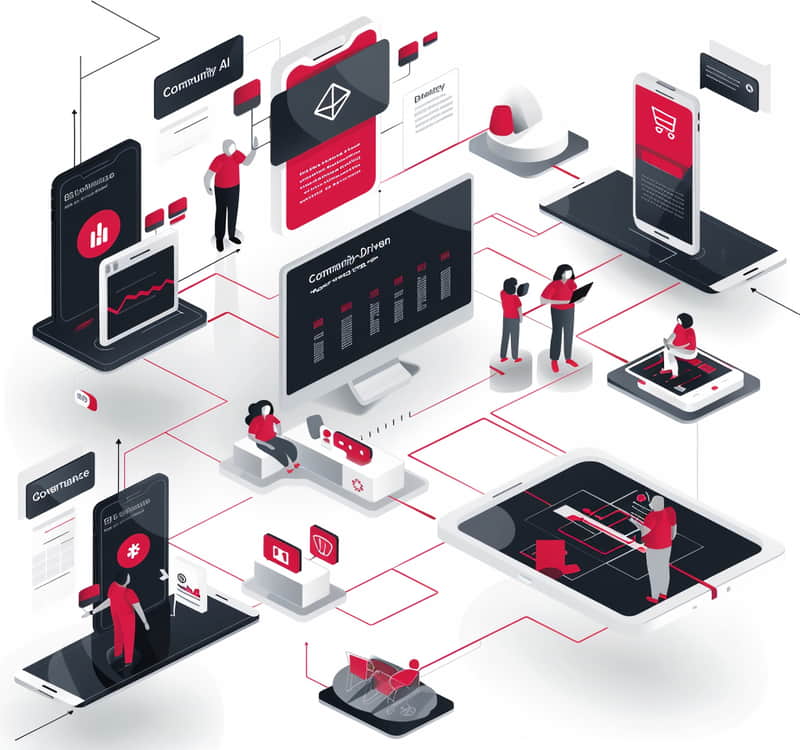Sitecore Interview Questions | Sitecore Developer Interview Questions
Sitecore Interview Questions!!! Are you feeling awkward during a Sitecore interview? Relax! Our extensive blog will provide you with all of the information and confidence you need to succeed!
Covering everything from basic foundations, customisation, security, analytics, and job interview questions, whether you’re transferring companies or joining CMS for the first time, our blog’s goal is to help turn worries into enthusiasm as we begin on our interview adventure together! From beginner to Sitecore interview questions for experienced can learn and expertise in Sitecore.
So, saddle up, unleash your potential, and let’s take this interview ride together!

Sitecore Interview Questions and Answers:
1. What is Sitecore and what are its benefits?
Sitecore is a platform that simplifies the process of authoring website content. It offers features such as the experience editor, media library, workbox, and recycle bin, and addresses issues related to data management, user experience, and workflows.
It is built for agile content delivery, global scalability, and ultra-fast performance, and caters to both developers and marketers.
2. What are the fundamentalsof CMS and why is it in high demand in the market?
The fundamentals of CMS is a high-demand technology in the market because it helps business users add, delete, and update website content without the need for a technical team.
The content management aspect of CMS involves managing text, images, videos, and PDFs, as well as managing access and security.
3. What are some of the main features of CMS?
Some of the main features of CMS include easy content creation and competition functionality, user management and security, SEO and analytics, multilingual capabilities, and continuous improvement.
4. Which are CMS platforms in the market?
WordPress, Drupal, Magento, Kentico, Content Home, Site Infinity, Shopify, Home Racco, Adolph, and Expertise Manager as some of the CMS platforms in the market.
5. What is the role of user management and security in CMS?
User management and security are integral parts of CMS. Users can create users and manage their access and permissions, while SEO and analytics provide insights into the presence of the site on the web.
6. What is Site Code and what products does it offer?
Site Code is a leading digital experience software that provides an integral platform for Content Management System (CMS), commerce, and digital marketing tools. It offers three main products: content, experience, and commerce.
The content includes a site code experience manager XM, a site code content hub, digital access management, CMP, and mRNA, and an experience platform.
7. What other products does Site Code offer besides the experience platform?
Site Code offers a site code customer data platform, personalized and e-commerce support, audit cloud, discover, and sensor products.
8. What are some important URLs for Site Code?
Some important URLs for Site Code include its official website, support website, partner website, and employee discounts.
9. What is the difference between a CMS and a DXP?
A CMS (Content Management System) is a platform for content authors to create and manage their content without any technical expertise, resulting in faster delivery of content.
The main features of a CMS include easy administration, multi-platform capabilities, workflow publishing, security and permissions, comprehensive search, and versioning.
A DXP (Digital Experience Platform) is integrated technologies built on top of a CMS, providing basic CMS capabilities and improving customer experiences across multiple channels.
10. What are DXP platforms and how do they differ from CMS?
DXP platforms are next-level technologies built on top of CMS, offering more comprehensive search and a more efficient way for content authors and managers to collaborate and communicate with customers. They provide a more integrated approach to managing content across multiple channels.
11. What is Headless E-Commerce and how does it differ from traditional CMS?
Headless E-Commerce is a platform that decouples backend and frontend functions, allowing content authoring to take place independent of where the content is being delivered. This is achieved through APIs, which deliver content to whichever channel it is required.
In contrast, traditional CMS had presentation built in, but with the emergence of different channels, content authoring functionalities have been decoupled from frontend presentation delivery.
12. What are some popular platforms that provide CMS, DXP, and headless E-Commerce?
Some popular platforms that provide CMS, DXP, and headless E-Commerce include those based on dotnet frameworks such as Microsoft Dotnet and Adobe Experience Manager, and pure headless platforms like Sitecore.
Sitecore, in particular, has been acquiring companies since 2018 and its main products include experience manager, experience platform, XE, and content hub.
13. What are the two main functions of Headless E-Commerce?
The two main functions of Headless E-Commerce are a backend (content authoring) and a frontend (frontend delivery). The backend provides a UI for content updates, while the frontend is where content is managed and updated and where users interact with the platform and the organization.
14. What role do APIs play in Headless E-Commerce?
APIs play a key role in Headless E-Commerce by delivering content to whichever channel it is required, decoupling content authoring functionalities from frontend presentation delivery.
15. What are the main capabilities of Experience Manager?
Experience Manager provides CMS capabilities, analytics, personalization’s, and commerce-related functionality.
16. What is XE and what features does it offer?
XE is a pure SaaS platform that offers distillery management, content marketing platform, product content management, marketing resource management, and more.
17. How can the content hub be hosted in Experience Platform?
The content hub can be hosted as an infrastructure as a service on-premise or Platform as a Service in the Experience Platform.

Sitecore Training

18. What are the main functions of the Experience Platform?
The Experience Platform mainly collects experience data, builds context, processes and aggregates it, indexes and segments it, and provides email marketing and marketing automation.
19. What is Sitecore (SXA) and how is it used?
Sitecore Experience Accelerator (SXA) is a JavaScript service used to accelerate the development of E-Commerce platforms. Developers can work on Sitecore, which is a combination of plain vanilla Sitecore solution and JavaScript services called JSS.
20. What is headless E-Commerce and which platforms offer it?
Headless E-Commerce is a platform that decouples backend and frontend functions, allowing content authoring and frontend presentation delivery. Popular platforms that offer this include DXP, Sitecore, and XE.
21. What is the SXA framework and what features does it offer?
The SXA (Sitecore Experience Accelerator) framework provides inbuilt components and extra features to build websites quickly and efficiently. Projects are mostly built on either SXA or JSS, which are JavaScript SDKs similar to the headless CMS features.
These components consume content using GraphQL, allowing for faster content authoring.
22. Which companies has Sitecore recently acquired and what are their products?
Sitecore has acquired Box Ever, CDP, 451 Commerce Order Cloud, and Most End Email Marketing in the past two months, but the integration of their products into Sitecore is not yet clear.
23. What SaaS platforms does Sitecore offer and what are their hosting options?
Sitecore offers SaaS platforms such as SXA, JSS, and Experience Edge. Hosting options include infrastructure services like Azure, Pass platform as service, and Experience Edge.
24. What is Experience Edge and how does it work?
Experience Edge is a pure SaaS service software from Sitecore that provides a content delivery platform on top of either Content Hub or XM. It allows users to consume content best suited for the Jam stack and new trends.

25. How do developers work with Sitecore and what are their partnership options?
Developers can work directly with Sitecore clients like Subbail, Real, or Martha Stewart, who maintain implementation in-house. Alternatively, they can partner with Sitecore partners and take their help in implementing solutions.
Developers have two options: working directly with the client if they have an Info stream, or working for partners. Partners have different levels of partnership status, with platinum being the highest.
26. What benefits do developers receive based on their partnership level?
Developers can receive features such as certification, learning portal coats, and free licenses based on their partnership level. Partner licenses are required for local and higher environments.
27. What tools does Sitecore support and what is its partnership with Microsoft?
Sitecore supports Exponent Web Forms, MVC, and C-Sharp. Sitecore has a strong partnership with Microsoft, as they are predominantly Microsoft shops that use Dotnet.
28. Who is Microsoft as a customer of Sitecore and what does their partner network use for personalization?
Microsoft is a customer of Sitecore, and their partner network uses AI and other features like AI for personalization.
29. What programming languages and tools are commonly used by developers working with Sitecore?
Developers use a variety of tools and languages with Sitecore, including DotNet, ASP.NET, MVC, Core, C-Sharp, SQL Server, Analytics Solar, Elastic Surge, JavaScript, build tools, and JavaScript frameworks like JSP, React, and AngularJS.
Docker is also popular for Sitecore implementation, and Sitecore has released an SDK for Docker.
30. What is GraphQL and how does it work with Sitecore?
GraphQL is a content delivery platform released by Sitecore that consumes JavaScript SDKs, JS, and GraphQL. Other systems can use GraphQL to consume content, making it easier for developers to work with Sitecore clients.
31. What is Helix and what principles does it represent?
Helix is a term often used by new developers to describe a tool or product from Sitecore. However, it is not a tool or product, but rather a set of principles that are object-oriented solid principles widely available in object-oriented programming.
Sitecore suggests using these principles to improve maintainability and implementation structure.
32. What is the difference between Helix and other tools or products from Sitecore?
Helix is a set of principles that help developers build better maintainability and implementation structures for their projects. It is not a tool or starter kit, but a set of principles that can be applied to various projects.
33. What is the Sitecore community and who can now access it?
The Sitecore community is a platform where developers can share their knowledge and experiences with other developers.
It was previously restricted to Platinum partners but is now open to all developers, allowing them to download XP or packages directly from the dev.sideco.com website.
34. What is the focus of the Sitecore product ecosystem?
The Sitecore product ecosystem includes products from Sitecore, the community, and technologies supported by Sitecore. The rapid adoption of JavaScript SDKs like Jenkins, Docker, Headless, Jamstack, and GraphQL is a key focus.
35. Why is the market moving towards SaaS platforms like Headless and Jamstack?
Clients are increasingly interested in SaaS platforms because they simplify maintenance and reduce the pressure of maintaining infrastructure services like Infosecure or other platforms.

Sitecore Training

36. What is the content hub in the Sitecore ecosystem?
The content hub is a SaaS option in the Sitecore ecosystem that allows anyone to implement a solution without needing to be a DotNet developer. It provides a GraphQL API, making it easier for clients to consume content or services and deliver it.
37. What skills do developers need to expand beyond in the Sitecore ecosystem?
Developers need to expand their skills beyond DotNet and become JavaScript developers, as the whole market is moving towards JavaScript. Familiarity with Sitecore and JavaScript SDKs like GraphQL is essential.
38. What are some advantages of using Site Core as a CMS?
Site Core offers numerous benefits as a CMS, including a user-friendly interface for content authoring, a content editor and experience editor, support for workflows for editing, approving, and publishing content, powerful multi-language support, media management, and tools for editing files like images, PDFs, documents, and Excel sheets. It also features a powerful content search engine.
39. How is Site Core customized and extended?
Site Core is highly extensible, with everything added in a custom way and the ability to bring in third-party modules to enhance its capabilities. A sandbox setup is created on a local system, and users can access the login page to create a content author account.
40. What administrative functionality is available in the Site Core control panel?
The Site Core control panel has administrative functionality, such as changing passwords, changing personal information, region and language options, and desktop functionality options.
Users can also customize the user interface and display settings. With in this blog you can also learn Sitecore Architect Interview Questions from this blog.
41. What are some key features of Site Core as a CMS?
Site Core is a powerful CMS with a user-friendly interface, content editor, experience editor, media management, content search engine, and a suite of marketing features. It is highly extensible and can be easily integrated with third-party modules.
42. What functions does the experience editor and media library serve in Site Core?
The experience editor allows users to update site content directly, while the media library is a special app for storing media files like images.
43. What is the workbox in Site Core and what does it do?
The workbox is an application that is part of the workflow in Site Core. It shows a list of items that need approval, and approvers can go through the worklist to review and approve them.
44. What is the launchpad in Site Core and what functions does it serve?
The launchpad is a part of the Site Core control panel that is used to change passwords, desktop backgrounds, and settings. It also provides quick access to various features.

45. What are the two types of digital experience platforms (DXP) offered by Sitecore?
Sitecore offers both a traditional all-in-one DXP and a newly released SaaS-based composable DXP.
46. What is integrated into the Sitecore Digital Experience Platform (DXP)?
Sitecore Experience Manager (XM) and all of the robust functionality included in Sitecore Experience Platform are integrated into one platform.
47. What is the successor to Sitecore XM and what are its features?
Sitecore XM Cloud is the successor to Sitecore XM. It is the linchpin to Sitecore’s composable DXP offering, allowing organizations to scale their tech stack up or down depending on their needs.
It is enterprise-ready, SaaS-based, headless CMS, Jamstack ready, and supports various frameworks such as NextJS, React, Angular, and dotnet.
48. What does XM Cloud offer?
XM Cloud offers agile content delivery with modern frameworks and APIs along with simple and intuitive visual authoring tools.
It allows for faster experiences, scalable content, multi-channel and multi-lingual global delivery, and reduced infrastructure costs and management.
49. What is Sitecore’s traditional personalization offering and what does the SaaS-based Sitecore Personalize offer?
Sitecore’s traditional personalization offering through XP delivers explicit component and page level personalization. The SaaS-based Sitecore Personalize is a personalization and testing tool that integrates with any digital property using either web or API integrations to deliver next-level personalized experiences at scale.
It uses real-time customer data to optimize experiences for both inbound and outbound channels across any digital property.
50. What does Sitecore Content Hub and digital asset management offer?
Sitecore Content Hub and digital asset management help streamline the content life cycle, get marketing teams on the same page, and allow for the automatic delivery of only approved digital assets to any channel or digital property.
51. What challenges does Sitecore help businesses tackle in terms of content delivery?
Sitecore helps businesses tackle challenges related to content velocity, ensuring personalized content is delivered to the right customers in real time.
It also addresses the speed and relevance paradox, ensuring relevant and targeted experiences are delivered without compromising site speed or performance.
52. How does Sitecore’s pricing structure differ from other enterprise digital experience platform solutions?
Sitecore offers a unique pricing structure based on consumption, not features, which means companies only pay based on traffic rather than features. This allows for more value to be delivered to companies of all sizes without having to pay for unnecessary bells and whistles.
53. What role do Sitecore partners play in the implementation and launch of the platform?
Sitecore partners are essential resources for getting the most out of the platform. They help build websites, create digital libraries, and ensure proper launch and go-live. Great partners maximize Sitecore’s capabilities and ensure maximum return on investment.

To sum up, Sitecore is a top provider of digital experience platforms, providing all-inclusive solutions for real-time management and delivery of tailored content to clients.
For companies of all sizes and sectors, its distinctive consumption-based pricing model and partners’ availability for installation and optimization make it a useful and affordable option.
By addressing issues with content velocity, the speed and relevance conundrum, and content consistency, Sitecore’s next-generation platform allows for quick loading times, scalability, and resilience.
Sitecore helps companies in any sector build engaging digital experiences that drive traffic and conversions by giving marketers the tools they need to produce, organize, and distribute content quickly and effectively.
I hope you give your best in your next interview.
All the Best!!!

Sitecore Course Price


Saniya
Author